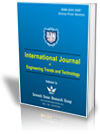Investigation of the Effect of Injection Timings on the Performance of an Internal Combustion Engine using Computational Fluid Dynamics
Citation
Ch.Moses Aravind, Hemachandra Reddy.K "Investigation of the Effect of Injection Timings on the Performance of an Internal Combustion Engine using Computational Fluid Dynamics", International Journal of Engineering Trends and Technology (IJETT), V48(7),393-397 June 2017. ISSN:2231-5381. www.ijettjournal.org. published by seventh sense research group
Abstract
Almost all the vehicles on road today are powered by internal combustion (IC) engines. Internal combustion engine is a heat engine in which the chemical energy of the fuel released in the combustion chamber is directly used to produce mechanical work. The performance of a DI Diesel Engine depends on many parameters like the time scales of the intake airflow, Fuel injection timings, Dynamics of turbulent reacting flows, Air fuel ratios and so on. It is well known that fuel injection strategies including fuel injection timings play a vital role in the performance of a DI Diesel engine. Computational Fluid dynamics (CFD) has emerged as an inevitable tool in the design of IC engines. Unlike the conventional experimental techniques, CFD predicts the detail insight into the spatial temporal variations of all the variables, without modifying or installing the components. Advent of powerful hardware, parallel processing techniques, cloud computing further enhanced CFD to significantly reduce the cost and turnaround time in the design process. In this study Computational Fluid Dynamics is used to investigate the effect of split injection system in comparison with uniform injection on the performance and emission components of a DI Diesel Engine.
References
[1] Shundoh, S., Komori, M., Tsujimura, K., Kobayashi, S., 1992. Nox Reduction from Diesel Combustion Using Pilot Injection with High Pressure Fuel Injection. SAE paper 920461
[2] Tow, T.C., Pierpont, A., Reitz, R.D., 1994. Reducing Particulate and NOx emissions by Using Multiple Injections in a Heavy Duty D.I. Diesel Engine. SAE Paper 940897.
[3] Zhang, Long, 1999. A Study of Pilot Injection in a DI Diesel Engine. SAE paper 1999-01-3493.
[4] Raouf Mobasheri, Zhijun Peng, Seyed Mostafa Mirsalim, 2012. Analysis the effect of advanced injection strategies on engine performance and pollutant emissions in a heavy duty DI-diesel engine by CFD modeling. International Journal of Heat and Fluid Flow 33 (2012) 59–69
[5] ANSYS Workbench 16 user Manual
[6] Reddy, CV Subba, C. Eswara Reddy, and K. Hemachandra Reddy. "Effect of fuel injection pressures on the performance and emission characteristics of DI Diesel engine with biodiesel blends cotton seed oil methyl ester." International Journal of Research and Reviews in Applied Sciences 13.1 (2012): 139-149.
[7] Prasad, T. Hari, K. Hema Chandra Reddy, and M. Muralidhara Rao. "Combustion, performance and emission analysis of diesel engine fuelled with methyl esters of Pongamia oil." International journal of oil, gas and coal technology 3.4 (2010): 374-384.
[8] Sreenivasulu, M., C. Nadhamuni Reddy, and K. Hemachandra Reddy. "Influence Of Swirl On Spray Characteristics And Combustion, A Numerical Investigation Of A Caterpiller Diesel Engine." International Journal of Engineering Science and Technology 4.10 (2012).
[9] Kumar, A. R., G. J. Raju, and K. H. Reddy. "Emission and performance characteristics of diesel engine using Mamey Sapote biodiesel as alternate fuel." International Journal for Research in Applied Science and Engineering Technology 3.7 (2015): 289-298.
Keywords
DI Diesel Engine, Computational Fluid Dynamics, injection strategies, Performance of a DI Diesel engine.



